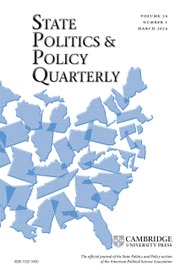Crossref Citations
This article has been cited by the following publications. This list is generated based on data provided by
Crossref.
Hylton, Mary E.
2015.
Civic Engagement and Civic Literacy Among Social Work Students: Where Do We Stand?.
Journal of Policy Practice,
Vol. 14,
Issue. 3-4,
p.
292.
Flavin, Patrick
and
Shufeldt, Gregory
2015.
State Party Competition and Citizens’ Political Engagement.
Journal of Elections, Public Opinion and Parties,
Vol. 25,
Issue. 4,
p.
444.
Flavin, Patrick
and
Shufeldt, Gregory
2016.
Party competition and citizens' political attitudes in the American states.
Electoral Studies,
Vol. 44,
Issue. ,
p.
235.
ROGERS, STEVEN
2017.
Electoral Accountability for State Legislative Roll Calls and Ideological Representation.
American Political Science Review,
Vol. 111,
Issue. 3,
p.
555.
Jaeger, William P.
Lyons, Jeffrey
and
Wolak, Jennifer
2017.
Political Knowledge and Policy Representation in the States.
American Politics Research,
Vol. 45,
Issue. 6,
p.
907.
Wolak, Jennifer
2017.
Public Expectations of State Legislators.
Legislative Studies Quarterly,
Vol. 42,
Issue. 2,
p.
175.
Wolak, Jennifer
2018.
Feelings of Political Efficacy in the Fifty States.
Political Behavior,
Vol. 40,
Issue. 3,
p.
763.
Minkoff, Scott L.
and
Lyons, Jeffrey
2019.
Living With Inequality: Neighborhood Income Diversity and Perceptions of the Income Gap.
American Politics Research,
Vol. 47,
Issue. 2,
p.
329.
Clark, Nicholas
and
Makse, Todd
2019.
Local media tone, economic conditions, and the evaluation of US governors.
Journal of Elections, Public Opinion and Parties,
Vol. 29,
Issue. 1,
p.
82.
Lorentz, Kevin
2019.
The Role of Periodic Conventions in Generating and Undermining Constitutional Loyalty.
SSRN Electronic Journal,
Langehennig, Stefani
Zamadics, Joseph
and
Wolak, Jennifer
2019.
State Policy Outcomes and State Legislative Approval.
Political Research Quarterly,
Vol. 72,
Issue. 4,
p.
929.
Wolak, Jennifer
2020.
Why Do People Trust Their State Government?.
State Politics & Policy Quarterly,
Vol. 20,
Issue. 3,
p.
313.
Barth, Jay
Burnett, Craig M.
and
Parry, Janine
2020.
Direct Democracy, Educative Effects, and the (Mis)Measurement of Ballot Measure Awareness.
Political Behavior,
Vol. 42,
Issue. 4,
p.
1015.
Cohen, Jeffrey E.
2020.
Relative Unemployment, Political Information, and the Job Approval Ratings of State Governors and Legislatures.
State Politics & Policy Quarterly,
Vol. 20,
Issue. 4,
p.
437.
Burden, Barry C
and
Ono, Yoshikuni
2021.
Ignorance is Bliss? Age, Misinformation, and Support for Women’s Representation.
Public Opinion Quarterly,
Vol. 84,
Issue. 4,
p.
838.
Brewer, Adam M
2021.
Strategic policy narratives: A narrative policy study of the Columbia River Crossing.
Public Policy and Administration,
Vol. 36,
Issue. 4,
p.
496.
Fortunato, David
and
Stevenson, Randolph T.
2021.
Party Government and Political Information.
Legislative Studies Quarterly,
Vol. 46,
Issue. 2,
p.
251.
Archer, Allison M. N.
and
Darr, Joshua P.
2022.
Gubernatorial Elections Change Demand for Local Newspapers.
American Politics Research,
Vol. 50,
Issue. 1,
p.
52.
Drutman, Lee
2022.
Moderation, Realignment, or Transformation? Evaluating Three Approaches to America’s Crisis of Democracy.
The ANNALS of the American Academy of Political and Social Science,
Vol. 699,
Issue. 1,
p.
158.
Buchanan, Ross
2023.
Pollution and the public: how information accessibility conditions the public’s responsiveness to policy and outcomes.
Journal of Public Policy,
Vol. 43,
Issue. 1,
p.
115.


